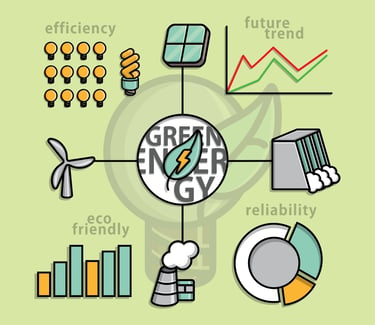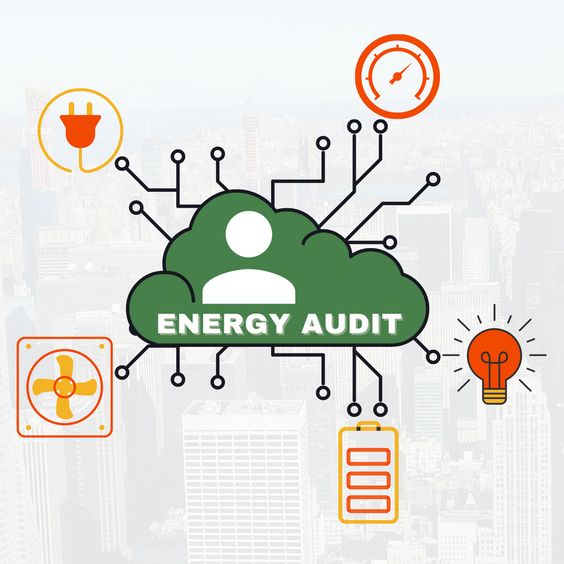What is Energy Audit? Understanding the Importance of Assessing Energy Efficiency
Unlock the Power of Savings! Discover What is Energy Audit and How It Can Slash Your Bills. Get the Ultimate Guide Now!
ENERGY AUDIT
Inventum Power Private Limited
5/26/20237 min read
Energy audits play a crucial role in understanding and optimizing energy usage, allowing individuals and businesses to enhance their sustainability efforts and reduce operational costs. In this article, we will explore the concept of Energy Audits, their purpose, the audit process, and the benefits they offer. Additionally, we will delve into the importance of hiring professional energy auditors, implementing audit recommendations, and various government initiatives and incentives that promote energy efficiency.
Energy is an essential resource that powers our daily lives. However, with growing concerns about climate change and rising energy costs, it is vital to evaluate and improve our energy consumption patterns. This is where energy audits come into the picture. An energy audit is a systematic assessment of energy usage in a building or facility, aiming to identify areas of inefficiency and propose solutions to reduce energy consumption.


The Purpose of Energy Audit
The primary purpose of an energy audit is to gain a comprehensive understanding of how energy is utilized within a structure or system. By conducting an audit, individuals and organizations can identify energy-saving opportunities, reduce environmental impact, and optimize their energy usage for improved efficiency. Energy audits also contribute to long-term sustainability goals by conserving valuable resources and reducing carbon footprints.
Types of Energy Audits
There are three main types of energy audits: walk-through audits, standard audits, and comprehensive audits. Walk-through audits are preliminary assessments that provide a basic understanding of energy consumption patterns. Standard audits involve a more detailed analysis, including data collection, analysis and evaluation of energy systems and equipment. Comprehensive audits are the most detailed and comprehensive assessments, involving in-depth analysis of energy usage, equipment performance, and potential energy-saving measures.
Energy Audit Process
The energy audit process typically involves several stages, starting with pre-audit preparations. This includes gathering information about the building or facility, such as floor plans, utility bills, and equipment specifications. On-site assessment is the next step, where auditors conduct a thorough inspection, collect data on energy usage, and identify areas of inefficiency. The data collected is then analyzed and evaluated to generate a comprehensive report that includes findings, recommendations, and potential cost savings.
Key Components of an Energy Audit
During an energy audit, several key components are examined to assess energy efficiency. These components include lighting systems, HVAC (Heating, Ventilation, and Air Conditioning) systems, insulation and air sealing, appliances and equipment, and the potential for integrating renewable energy sources. Each component is evaluated to identify energy-saving opportunities and suggest improvements that can lead to reduced energy consumption.


Common components evaluated during an energy audit:
Lighting systems:
Assessment of lighting fixtures and bulbs
Analysis of lighting control systems (e.g., occupancy sensors, daylight harvesting)
HVAC systems:
Evaluation of heating and cooling equipment
Inspection of ductwork and ventilation systems
Optimization of thermostat settings
Insulation and air sealing:
Identification of air leaks and drafts
Evaluation of insulation levels in walls, roofs, and floors
Recommendations for sealing air leaks and improving insulation
Appliances and equipment:
Analysis of energy-consuming appliances and equipment
Assessment of energy-efficient alternatives
Recommendations for equipment upgrades or replacements
Renewable energy potential:
Assessment of the feasibility of integrating renewable energy sources
Evaluation of solar panels, wind turbines, or geothermal systems
Analysis of potential cost savings and environmental benefits
Benefits of Energy Audits
Energy audits offer numerous benefits to individuals, businesses, and the environment. Some of the key advantages include:
Cost savings: Energy audits help identify energy-saving opportunities that, when implemented, can significantly reduce energy bills and operational costs.
Environmental impact: By optimizing energy usage, energy audits contribute to reducing greenhouse gas emissions and promoting environmental sustainability.
Improved comfort and productivity: Addressing energy inefficiencies can result in improved comfort levels within buildings, leading to increased occupant satisfaction and productivity.
Hiring a Professional Energy Auditor
To ensure a thorough and accurate energy audit, it is recommended to hire a professional energy auditor. When selecting an auditor, consider the following factors:
Credentials and certifications: Look for auditors with recognized certifications such as Certified Energy Manager (CEM) or Building Energy Auditor (BEA).
Experience and expertise: Choose auditors with a proven track record and experience in conducting energy audits for similar buildings or facilities.
Client testimonials: Review testimonials and references from previous clients to gauge the auditor's competence and professionalism.
Conduct an Energy Audit Today
Call Us : - +91 9716667972


Implementing Energy Audit Recommendations
Once an energy audit is completed, it is essential to prioritize and implement the recommended energy-saving measures. Consider factors such as the return on investment (ROI), feasibility of implementation, and potential long-term cost savings. It is also crucial to establish a system for tracking and monitoring energy usage to ensure the effectiveness of implemented measures.
Case Studies: Successful Energy Audits
Examining real-life case studies can provide insights into the effectiveness of energy audits. Here are three examples:
Residential energy audit: A homeowner conducted an energy audit and implemented recommendations such as upgrading insulation, installing energy-efficient lighting, and optimizing HVAC systems. As a result, the homeowner experienced a significant reduction in energy bills and improved indoor comfort.
Commercial energy audit: A small business underwent an energy audit that identified opportunities for energy savings in lighting, HVAC, and equipment. By implementing energy-efficient measures and making behavioral changes, the business achieved substantial cost savings and enhanced sustainability practices.
Industrial Energy Audit: An industrial facility conducted a comprehensive energy audit, which revealed inefficiencies in their manufacturing processes, equipment, and lighting systems. By implementing energy-saving recommendations, the facility reduced energy consumption, leading to considerable cost savings and a more sustainable operation.
Government Initiatives and Incentives
Governments around the world have recognized the importance of energy efficiency and have implemented various initiatives and incentives to encourage energy audits and promote sustainable practices. Some of these include:
Energy efficiency programs: Governments offer programs that provide financial assistance, technical support, and resources for energy audits and energy-saving projects.
Tax credits and rebates: Tax incentives and rebates are often provided to individuals and businesses that undertake energy-saving measures recommended by an energy audit.
Grant opportunities: Government grants and funding opportunities are available for implementing energy efficiency measures, especially for projects that contribute to carbon reduction and sustainability goals.
Common Misconceptions about Energy Audits
There are several misconceptions surrounding energy audits that can deter individuals and businesses from pursuing them. Let's address and debunk some of these misconceptions:
"It's too expensive": While there may be costs associated with conducting an energy audit, the long-term savings resulting from energy efficiency improvements often outweigh the initial investment.
"My building is already efficient": Even buildings that have implemented energy-efficient measures can benefit from an energy audit. Audits can identify further opportunities for improvement and ensure that existing systems are operating optimally.
"Energy audits are only for large businesses": Energy audits are beneficial for buildings of all sizes, including residential homes, small businesses, and large industrial facilities. The energy-saving measures recommended can be tailored to the specific needs of each building type.
Energy Audit Tips for Homeowners
Homeowners can also take steps to assess their energy usage and identify areas for improvement. Here are some energy audit tips for homeowners:
Conducting a DIY energy audit: Start by conducting a DIY energy audit, which involves inspecting windows and doors for air leaks, checking insulation levels, and assessing energy usage patterns.
Simple energy-saving measures: Implement simple measures like using energy-efficient light bulbs, adjusting thermostat settings, and unplugging unused electronics to reduce energy consumption.
Long-term planning and upgrades: Consider long-term planning for energy-efficient upgrades such as installing solar panels, upgrading appliances to ENERGY STAR certified models, and improving insulation.
Conduct an Energy Audit Today
Call Us : - +91 9716667972
Future Outlook and Importance of Energy Audits
The future holds immense significance for energy audits. As the world faces the challenges of climate change and a transition to renewable energy sources, energy audits will play a crucial role in optimizing energy usage, reducing carbon emissions, and achieving sustainability goals. With increasing energy costs and a growing awareness of the need for energy efficiency, energy audits will become an essential tool for individuals, businesses, and governments.
By conducting regular energy audits and implementing the recommended measures, we can make significant strides towards a more sustainable future. Energy audits not only help save costs but also contribute to environmental conservation and improved comfort and productivity in our buildings and facilities.
Conclusion:-
In conclusion, energy audits are vital for understanding and optimizing energy efficiency. They provide valuable insights into energy consumption patterns, identify areas of inefficiency, and propose measures to reduce energy usage and costs. Whether it's for residential, commercial, or industrial purposes, energy audits offer numerous benefits, including cost savings, environmental impact reduction, and improved comfort. By hiring professional auditors, implementing recommendations, and taking advantage of government initiatives, we can embrace a more sustainable approach to energy consumption. When it comes to energy audits, Inventum Power Private Limited stands out as a top-notch company. With their expertise, professionalism, and commitment to delivering comprehensive assessments, they have established themselves as a trusted name in the industry. By choosing Inventum Power, individuals and businesses can rest assured that they are partnering with the Best Energy Audit Company for their needs.
FAQs (Frequently Asked Questions)
1. How long does an energy audit typically take?
The duration of an energy audit can vary depending on the size and complexity of the building or facility. A walk-through audit may take a few hours, while a comprehensive audit can take several days or even weeks to complete.
2. Are energy audits only relevant for older buildings?
No, energy audits are beneficial for buildings of all ages. Even newer buildings can have energy inefficiencies that can be identified and improved through an energy audit.
3. Can I conduct my own energy audit at home?
Yes, you can perform a basic energy audit at home by inspecting windows and doors for air leaks, checking insulation levels, and assessing energy usage habits. However, for a more comprehensive analysis, it is recommended to hire a professional energy auditor.
4. How often should I conduct an energy audit?
For commercial and industrial buildings, energy audits are typically conducted every few years or when significant changes occur in energy usage or building systems. For homeowners, conducting an energy audit every 5-10 years is a good practice.
5. Will implementing energy audit recommendations guarantee cost savings?
Implementing energy audit recommendations can significantly reduce energy consumption and costs. However, the actual savings will depend on factors such as the type and scale of improvements made, energy prices, and usage patterns. It's important to carefully analyze the return on investment (ROI) for each recommended measure.
Remember, energy audits are an essential step towards achieving energy efficiency, reducing carbon footprints, and contributing to a sustainable future. By understanding and optimizing our energy usage, we can make a positive impact on both our wallets and the environment.
Noida - 2nd Floor, B-52, Block-B, Sector 64, Noida, Uttar Pradesh 201301
Address
Subscribe to our newsletter
Services
Solutions
Copyright © 2026 | All Rights Reserved
Get in touch
Bhiwadi - Europa 3, Kajaria Greens,Alwar Bypass Road, Bhiwadi, 301019
Faridabad - 63A, Sector - 91 , Faridabad, Haryana - 121003
Delhi - 2nd Floor, C-41, Pandav Nagar Complex Delhi, 110092
